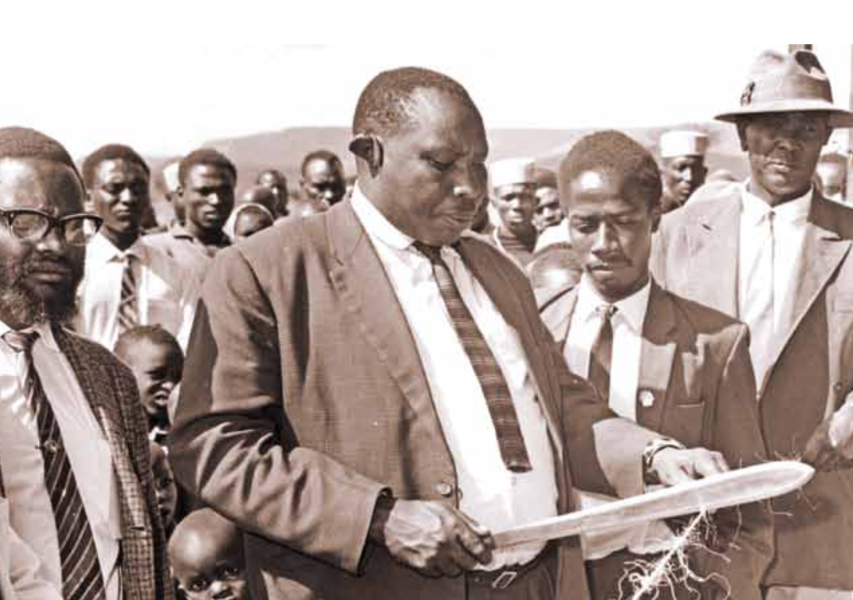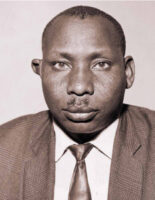
From 1963 to 1983, Stanley Shapashina ole Oloitiptip bestrode Maasai politics like a colossus, and when he dropped out of the national limelight, his political career collapsed like a house of cards – ending with a 12-month jail term.
Born in 1924 in Endoinyo Oontawua, at the foot of Mt Kilimanjaro, Oloitiptip was the third born of Naseramporro and Olong’oyana Oloitiptip and a member of the Irmingana sub-clan of the Ilaitayiok clan. The clan occupies the Olgulului Ilolarashi Group Ranch, with the Amboseli National Park at the heart of it.
It was both the politics of conservation and the continued allocation of Maasai land that defined his career as the Member of Parliament for Kajiado South Constituency. Oloitiptip had little formal education, only going up to Standard Four at the Narok Government School, where he sat for the Kenya African Preliminary Examination (KAPE) in 1941.
When World War II broke out, the Kajiado region turned into a war zone as allied troops battled German Forces from Tanganyika. Oloitiptip, then aged 19, joined the Kings African Rifles as a nursing orderly and joined other African soldiers who were airlifted to the war zones of Burma, India and Ceylon.
He rose to the rank of Sergeant before he returned in 1945 to work in the colonial government’s Department of Health as a Medical Assistant in Kajiado District. He also ran a clinic in Il Bissil.
During the Mau Mau freedom fighters’ uprising, the British colonialists turned to Kenyans outside the Kikuyu, Embu and Meru communities to help crush the movement. As a sympathiser of the struggle for independence, Oloitiptip refused to be conscripted and managed to convince his clan not to support the British.
With the jailing of Jomo Kenyatta, who would later become the country’s first President, the next stage of politics involved the future of Kenya, and land became a thorny issue.
The Maasai had lost millions of acres to big colonial ranches and wanted to negotiate a post-independence deal that brought together their most learned people, among them Oloitiptip, to form the Maasai United Front (MUF) to advocate for Maasai rights. He was elected Chairman and joined hands with a young newspaper journalist working for the Daily Nation, John Keen, as the Secretary General, and Justus ole Tipis.
The British government insisted on a willing-buyer willing-seller policy rather than a blanket return of the ‘lost’ land to the communities. While the Kenya African National Union (KANU) party also pushed for the right to buy land anywhere as enshrined in the Constitution under the Bill of Rights, the MUF wanted to safeguard Maasai interests against the large tribes, especially the Kikuyu and the Luo, who had congregated under KANU.
As MUF Chairman, Oloitiptip was part of the Maasai delegation that went to press for Maasai rights during the Lancaster House Conference in the pre-independence period.
In the June 1963 General Election, Oloitiptip vied for the Kajiado South seat on a Kenya African Democratic Union (KADU) party ticket and won, thus launching a parliamentary career that would span an uninterrupted 23 years. From this victory, he emerged as the senior-most Maasai politician after Keen failed to capture the Kajiado North seat.
Post-independence party politics in Maasailand revolved around the personalities of Keen and Oloitiptip as they both jostled for KANU leadership. Determined to oust his rival, Keen organised local party branch elections in 1969 in which all of Oloitiptip’s supporters were locked out. In his victory speech, Keen accused Oloitiptip of keeping the Maasai “under a thick blanket”.
But it was Oloitiptip who had the last laugh. Robert Matano, the KANU Secretary General, overturned the elections and returned Oloitiptip’s men. Keen was by then the KANU Organising Secretary and Oloitiptip a Cabinet Minister. Oloitiptip, a conservative Maasai, believed the Maasai should not be forced to change their lifestyle, which kept him at constant loggerheads with Keen and his supporters.
Oloitiptip was pivotal in all discussions that involved the Maasai, and any policies formulated either by donors or international conservation groups had to involve him as the link man to the community. Money from wildlife started to stream into the community, along with the building of schools as well as hotels to cater for tourists. Oloitiptip’s wealth also grew.
When development of the Kimana Group Ranch was proposed outside the expansive Amboseli National Park, Oloitiptip seized the chance to own a lodge next to the ranch. The Kimana Safari Lodge was opened in 1978 and was expected to cash in on tourists outside Amboseli. This endeared him to the powers around Kenyatta, and he became a close friend of many politicians also eager to set up tourist camps outside the national park.
In national politics, Oloitiptip was eclipsed by powerful Cabinet figures from Central Province as he headed the Ministry of Natural Resources, at the time considered to have scant prestige.
He distinguished himself during the Change-the-Constitution episode of 1976 by confronting Central Province heavyweights who included Njenga Karume, Kihika Kimani, Jackson Angaine and Njoroge Mungai.
Oloitiptip joined the group supporting the Vice President, Daniel arap Moi, which comprised Attorney General Charles Njonjo and Cabinet Minister G.G. Kariuki. Oloitiptip was credited with collecting protest signatures from MPs opposed to the Karume-Kimani-Angaine campaign, which he called unethical, immoral and bordering on criminality. By then, only Shariff Nassir, a Cabinet Minister from Coast Province, had openly opposed the leaders from Central Kenya.
Oloitiptip collected 98 signatures from MPs, among them 10 Cabinet ministers, sounding the death knell to any possibility of the Change-the-Constitution lobby group forcing any changes through Parliament. In addition, they were unable to muster the two-thirds majority required.
When Kenyatta died in 1978, Moi took over as President and after the 1979 General Election, he appointed Oloitiptip as Minister for Home Affairs. But it was a later appointment as Minister for Local Government that enabled Oloitiptip to change the landscape of local authorities by increasing the number of municipal and urban councils through the elevation of obscure rural shopping centres to municipal and town status.
The Minister also promised government funding for water, sewerage and other infrastructure, an issue that would feature during a Commission of Inquiry set up by Moi to investigate the conduct of Njonjo in 1984. With powerful forces within the Moi presidency all fighting for a place at the table, Oloitiptip had sided with Njonjo in his bitter wars with the VP, Mwai Kibaki.
In 1981, the two sides held separate political rallies; Njonjo was in Kikuyu Constituency while Kibaki was hosted in Mathare by Cabinet Minister Munyua Waiyaki. The Njonjo meeting attacked “anti-Moi elements”, while Kibaki held the view that no one had the mandate to screen who was or was not loyal to Moi.
Oloitiptip took Kibaki on for that slur, saying the VP was ignorant of how the government operated. He would also answer Martin Shikuku, the MP for Butere, who had questioned the source of wealth of some Cabinet ministers. Oloitiptip dismissed Shikuku and his friends as a “bunch of communist agents too lazy to work to get rich”.
Yet it was Kibaki who would earn Moi’s support when, in 1984, the President warned politicians against undermining the VP. This soon triggered a debate speculating about a “traitor” in the ranks, which would lead to the downfall of Njonjo and his allies. Those targeted were Oloitiptip, Zachary Onyonka, Charles Rubia and G.G. Kariuki.
Oloitiptip was the only Minister allied to Njonjo who won back his seat after the snap 1983 General Election. However, Moi relegated him to the backbench.
He was later arrested for flouting tax laws, and in June 1984 was jailed for 12 months for failing to pay taxes on a hotel he owned in Loitokitok Town. He was then expelled from KANU and lost his parliamentary seat in a by-election that was won by Moses ole Kenah.
Upon his release from jail as an ailing man, he retreated from public life to manage his wealth, which included residential houses in Nairobi’s Lavington Estate, a slaughterhouse, several ranches and a tourist lodge. Troubled by health issues, Oloitiptip died on 22 January 1985, aged 61.
